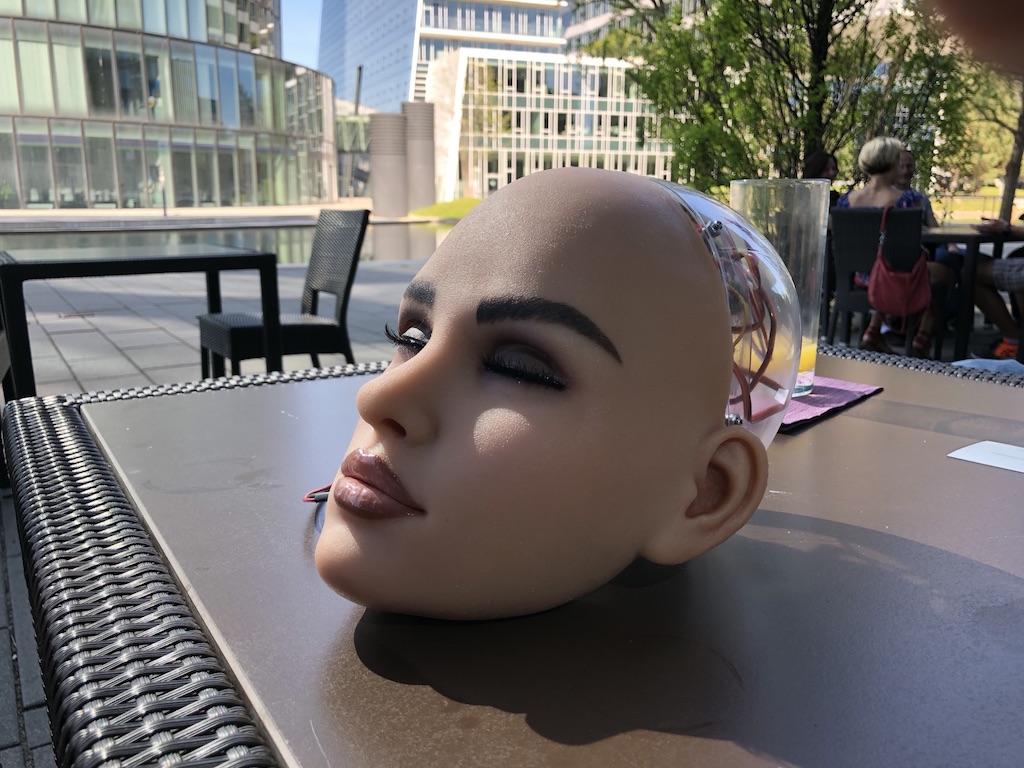A multi-stage HUGGIE project is currently underway at the School of Business FHNW under the supervision of Prof. Dr. Oliver Bendel. Ümmühan Korucu and Leonie Stocker (formerly Leonie Brogle) started with an online survey. The aim was to gain insights into how people of all ages and sexes judge a hug by a robot. In crises and catastrophes involving prolonged isolation, such as the COVID 19 pandemic, proxy hugs of this kind could well play a role. Prisons and longer journeys through space are also possible fields of applications. Nearly 300 people took part in the online survey. The evaluation is almost complete and the results are remarkable. Among other things, it was found that women want to be hugged by a robot that is bigger than them, and men want to be hugged by a robot that is smaller than them. Not only the size is relevant for the acceptance of robotic hugging: “An interesting input given by one of the participants was that it could be more pleasant to hug a robot if it smelled nicely, for example like chocolate.” (Draft of Bachelor Thesis) Whether this is a typically Swiss view remains to be investigated. The results of the survey and the conclusions drawn from them for the design of HUGGIE will be compiled in a paper in the course of the year.
Talking to Harmony
At the end of June 2020, DIE WELT conducted an interview with Prof. Dr. Oliver Bendel about sex robots and love dolls. It was especially about their natural language skills. Particularly owners and users who want to have a relationship are interested in conversations of all kinds, about God and the world and in the sense of “dirty talk”. Companies like Realbotix go very far in this respect. Harmony for example can talk to her partners for hours in a quite convincing way. The engineers experiment with GPT-2, but also with other language models. Kino Coursey, AI boss of Realbotix, deals with this topic in his article “Speaking with Harmony” for the book “Maschinenliebe” (“Machine Love”) which will be released in October. The interview with Oliver Bendel was published on 11 July 2020 in the printed edition of DIE WELT, under the title “Intelligente Sexroboter sind begehrte Gesprächspartner” (already published the day before in the electronic edition, under the title “Was Sexpuppen können” …). In addition, an English version – “Intelligent sex robots are sought-after dialogue partners” – is available.
Machine Love
The book “Maschinenliebe” (“Machine Love”/”Machines of Love”/”Machines for Love”/”Love for Machines”), edited by Oliver Bendel, has gone into production. The subtitle is “Liebespuppen und Sexroboter aus technischer, psychologischer und philosophischer Perspektive” (“Love Dolls and Sex Robots from a Technical, Psychological and Philosophical Perspective”). The volume contains contributions by internationally renowned experts as well as interviews with a love doll brothel operator and a sex worker. It has about 200 pages and some color illustrations. Three of the 16 contributions are in English. They come from internationally renowned experts in this field, from Kate Devlin (King’s College London), Yuefang Zhou and Martin H. Fischer (University of Potsdam), and Kino Coursey (Realbotix; picture by courtesy of this company). The book will be published in autumn 2020. Further information is available at www.springer.com/de/book/9783658298630.
Robot Performs COVID-19 Tests
The COVID-19 pandemic has given a boost to service robotics. Transport, safety and care robots are in demand, as are cleaning and disinfection robots. Service robots measure the temperature of passengers at airports and railway stations. Now they can also perform COVID-19 tests. “Robotics researchers from the University of Southern Denmark have developed the world’s first fully automatic robot capable of carrying out throat swabs for Covid-19, so that healthcare professionals are not exposed to the risk of infection. The prototype has successfully performed throat swabs on several people. The scientists behind are cheering: The technology works!” (Website SDU, 27 May 2020) A robot arm as known from the industry was used. The end piece comes from the 3D printer. This is another example from the health sector that shows how industrial robots – such as cobots – can become service robots. More information via www.sdu.dk/en/nyheder/forskningsnyheder/robot-kan-pode-patienter-for-covid-19.
And the Winner is … Lio!
DIH-HERO is a project in the healthcare sector supported by the European Union since January 2019. According to the website, the mission is to create a sustaining network that connects players in the healthcare sector and to support small and medium sized enterprises. “Currently, Europe and countries all over the world are facing a global pandemic. Together with its extensive Robotics in Healthcare European network DIH-HERO decided to support the fight against COVID-19 by providing €1,000,000 for robotic technologies that can be deployed timely, in order to support healthcare professionals and save lives by satisfying a current clinical demand or need.” (Website DIH-HERO) F&P Robotics based in Switzerland is one of the winners of the announcement. Lio – one of the company’s flagships – will now learn new tasks in the field of disinfection (door traps, lift buttons). The normal use of the care robot was last described in a paper by Oliver Bendel (School of Business FHNW), Alina Gasser and Joel Siebenmann (F&P Robotics) that was accepted at the AAAI 2020 Spring Symposia. Because of COVID-19 the lecture was postponed to late autumn.
Considerations on Bodyhacking
In the case of bodyhacking one intervenes invasively or non-invasively in the animal or human body, often in the sense of animal or human enhancement and sometimes with the ideology of transhumanism. It is about physical and psychological transformation, and it can result in the animal or human cyborg. Oliver Bendel wrote an article on bio- and bodyhacking for Bosch-Zünder, the legendary associate magazine that has been around since 1919. It was published in March 2020 in ten languages, in German, but also in English, Chinese, and Japanese. Some time ago, Oliver Bendel had already emphasized: “From the perspective of bio-, medical, technical, and information ethics, bodyhacking can be seen as an attempt to shape and improve one’s own or others’ lives and experiences. It becomes problematic as soon as social, political or economic pressure arises, for example when the wearing of a chip for storing data and for identification becomes the norm, which hardly anyone can avoid.” (Gabler Wirtschaftslexikon) He has recently published a scientific paper on the subject in the German Journal HMD. More about Bosch-Zünder at www.bosch.com/de/stories/bosch-zuender-mitarbeiterzeitung/.
A Morality Markup Language
There are several markup languages for different applications. The best known is certainly the Hypertext Markup Language (HTML). AIML has established itself in the field of Artificial Intelligence (AI). For synthetic voices SSML is used. The question is whether the possibilities with regard to autonomous systems are exhausted. In the article “The Morality Menu” by Prof. Dr. Oliver Bendel, a Morality Markup Language (MOML) was proposed for the first time. In 2019, a student research project supervised by the information and machine ethicist investigated the possibilities of existing languages with regard to moral aspects and whether a MOML is justified. The results were presented in January 2020. A bachelor thesis at the School of Business FHNW will go one step further from the end of March 2020. In it, the basic features of a Morality Markup Language are to be developed. The basic structure and specific commands will be proposed and described. The application areas, advantages and disadvantages of such a markup language are to be presented. The client of the work is Prof. Dr. Oliver Bendel, supervisor Dr. Elzbieta Pustulka.
Stanford University Must Stay in Bed
Stanford University announced that it would cancel in-person classes for the final two weeks of the winter quarter in response to the expanding outbreak of COVID-19. Even before that, the school had set its sights on larger events. These included the AAAI Spring Symposium Series, a legendary conference on artificial intelligence, which in recent years has also had a major impact on machine ethics and robot ethics or roboethics. The AAAI organization announced by email: “It is with regret that we must notify you of the cancellation of the physical meeting of the AAAI Spring Symposium at Stanford, March 23-25, due to the current situation surrounding the COVID-19 outbreak. Stanford has issued the following letter at news.stanford.edu/2020/03/03/message-campus-community-covid-19/, which strongly discourages and likely results in cancellation of any meeting with more than 150 participants.” What happens with the papers and talks is still unclear. Possibly they will be part of the AAAI Fall Symposium in Washington. The symposium “Applied AI in Healthcare: Safety, Community, and the Environment”, one of eight events, had to be cancelled as well – among other things, innovative approaches and technologies that are also relevant for crises and disasters such as COVID-19 would have been discussed there.
Moral and Immoral Machines
Since 2012, Oliver Bendel has invented 13 artifacts of machine ethics. Nine of them have actually been implemented, including LADYBIRD, the animal-friendly vacuum cleaning robot, and LIEBOT, the chatbot that can systematically lie. Both of them have achieved a certain popularity. The information and machine ethicist is convinced that ethics does not necessarily have to produce the good. It should explore the good and the evil and, like any science, serve to gain knowledge. Accordingly, he builds both moral and immoral machines. But the immoral ones he keeps in his laboratory. In 2020, if the project is accepted, HUGGIE will see the light of day. The project idea is to create a social robot that contributes directly to a good life and economic success by touching and hugging people and especially customers. HUGGIE should be able to warm up in some places, and it should be possible to change the materials it is covered with. A research question will be: What are the possibilities besides warmth and softness? Are optical stimuli (also on displays), vibrations, noises, voices etc. important for a successful hug? All moral and immoral machines that have been created between 2012 and 2020 are compiled in a new illustration, which is shown here for the first time.
Care Robots with Sexual Assistance Functions
The paper “Care Robots with Sexual Assistance Functions” by Oliver Bendel was accepted at the AAAI 2020 Spring Symposia. From the abstract: “Residents in retirement and nursing homes have sexual needs just like other people. However, the semi-public situation makes it difficult for them to satisfy these existential concerns. In addition, they may not be able to meet a suitable partner or find it difficult to have a relationship for mental or physical reasons. People who live or are cared for at home can also be affected by this problem. Perhaps they can host someone more easily and discreetly than the residents of a health facility, but some elderly and disabled people may be restricted in some ways. This article examines the opportunities and risks that arise with regard to care robots with sexual assistance functions. First of all, it deals with sexual well-being. Then it presents robotic systems ranging from sex robots to care robots. Finally, the focus is on care robots, with the author exploring technical and design issues. A brief ethical discussion completes the article. The result is that care robots with sexual assistance functions could be an enrichment of the everyday life of people in need of care, but that we also have to consider some technical, design and moral aspects.” The paper had been submitted to the symposium “Applied AI in Healthcare: Safety, Community, and the Environment”. Oliver Bendel will present the paper at Stanford University between 23 and 25 March 2020.









